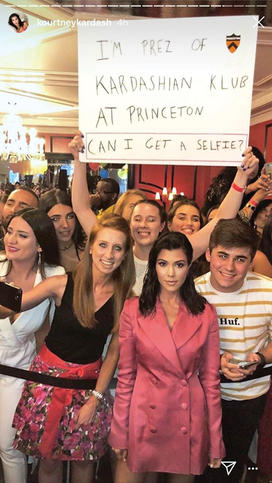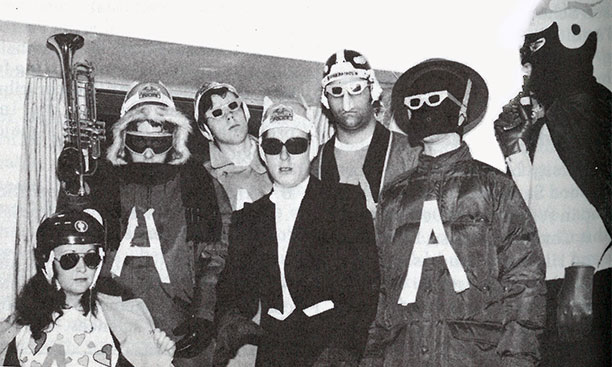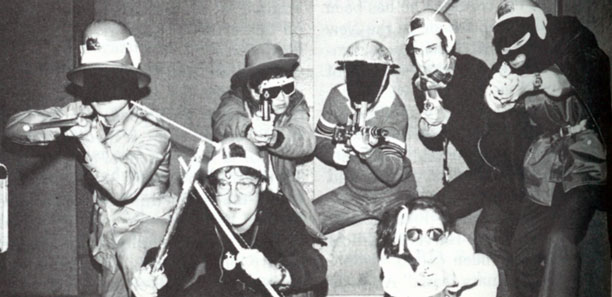Rally ’Round the Cannon: Fools’ Gold
In which the columnist learns something despite himself
“Anyone dumb enough to get his political information from a comic strip deserves what he gets at the polls.”
— Garry Trudeau
It has been a long, cruddy winter. And then I turned to the news from our nation’s capital, a euphemism seemingly constructed in the fear that Washington himself might otherwise return to life, look around at his namesake, and incite another revolution.

Mired in this slough of despond, I am inspired by two shining beacons: First, the publication date above, which I choose to interpret as a license to giggle if not outright guffaw; and second, the Kardashian Lifestyle Klub. Member Ellie Schwartz ’20’s recent vibrant PAW dispatch provides a whimsical portrait not only prompting a smile, but fails to include the names Trump, Kim, or Putin even once. This seeming conscious strategy of nonsensical joy is something you may be surprised to see endorsed here, but recall that I knowingly worked as emcee for 26 consecutive P-rades, perhaps not so totes magotes as Keeping Up with the Kardashians, but certainly just as stylish. And having opined previously on the overseriousness of student life, it is only fair I do so.
Coincidentally, the patter of little editorial feet approaches to remind me this is a history column. Remember history? So in the best of can-do April Fool’s Day spirit, I consulted my earlier article on Princeton pranks for inspiration and perhaps a levitational analog of today’s KLK, and there it was. Not in the 10 adventures cited, but in the comments — didn’t think I read the comments, eh? — wherein we find both the unbounded glee of the math majors in rewiring the elevator buttons in Fine Tower and the saga of a movement, worthy of the deep complexity of the Kardashians, which for one brief shining moment reigned at Princeton as the next best thing to Camelot — namely the Antarctica Liberation Front.
Long before social media, the ALF — and the name is not nonsensical, as you’ll see — realized an ingenious method of getting a real campus reaction to their inspired brainlessness: Put it on the ballot. The members of the Class of ’82 who thought up the insurgency, which is but the least confusing manner in which to think of it, were clearly disenchanted with student government and felt that the appropriate solution was not to knowingly improve it, but to spend good time and energy creatively deconstructing it and proposing to render it inert. I would point out this was in 1979, five years after Watergate and four years after Vietnam; Americans were hostage in Iran, Ronald Reagan was campaigning on the concept that the government was the problem, and the brilliant rock group Devo — the only pop act I’ve ever known to formally espouse a theory of anthropological decline — was riding high. If you didn’t seriously consider ignoring all that and opting for Fantasyland, you were just not paying attention.
Anyway, the Antarctica Liberation Front took alt-life in 1979 as John Muller ’82 ran for University Council delegate under its banner. The ALF also ran candidates for ’82 class positions. The hot student issue was CURL — the University’s proposal that eventually became the residential colleges three years later. When quizzed about the strategy, Muller opposed it because it did not address the purification of Antarctica, as required by the Twelve Tablets of Drivel, and cited his principal electoral advantage — his posters contained the most buzzwords. Can’t you just hear a Kardashian primping offstage, camera left?
By the following year, the ALF slate was up to a full six people, and Muller was running for chairman of the USG. He noted the primary deficiency of the previous administration — ignorance of Antarctica, “the Continent of Destiny.” The platform had also rounded out, and included:
- Purging any remaining competent elements of the USG
- Establishing a student-based theocracy
- Closing the Pub, a bold move to “eliminate something everyone likes”
- Banning things wherever possible: contour sheets, bright-green tennis balls, etc.
- Arming the proctors with heat-seeking missiles to eliminate illicit dorm hot pots
- Sponsoring wild, drunken orgies during reading period
- Pointing out that grades were biased in favor of those who were smart or worked hard, so should instead be distributed via lottery
- Increasing efficiency by distributing sophomores alphabetically among departments
- Spending the USG budget on purification pilgrimages to Antarctica
Of the vote total, 38 percent went to the ALF. Really. And Leslie Ehrlich ’82, running for social chair, received the highest vote total of any candidate for any office, after promising in print to keep everyone severely intoxicated every minute until Commencement. “It will be a year to remember — too bad you won’t be able to remember it.” She resigned the following month, citing an attack of illness: “They were sick of me.”
You know where this is going, right?
Sure enough, in February 1981 the ALF USG Chair candidate Daniel Arovas ’82 lost … by six votes. Three of his five ballotmates won. Muller was the new USG vice-chair, and pledged to rule via “the four Fs: friends, flunkies, functional illiterates, and fictional characters.” As fate would have it, he was charged with conducting the caucus to organize the new USG, and presided with a jester’s hat, the USG gavel, and a cap pistol. While most ALF initiatives were tabled, including the appointment of Arovas as parliamentarian (of all things) and allocation of the entire $100,000 budget to liberate the “Continent of Destiny,” there was 12-3 approval of a ban on “alligator shirts, alligator belts, alligator socks, alligator anything else, bright-green pants or pink shirts.” New undergraduate life chair Jordan Becker ’82 felt “that we were elected by students who intended to make a mockery of the USG. We owe something to our constituents.”
That clearly didn’t include hanging around for a year of governance, regardless of the eventual identity of the parliamentarian. At the subsequent hastily added meeting of the caucus, the fix was in. Resolutions passed by suspiciously large majorities:
- Renaming every university building over 5 feet, 5 inches “Daniel P. Arovas Hall” in honor of the failed ALF chair candidate who was 5 feet, 5 inches tall.
- Declaring martial law on campus
- Holding the USG chair in “protective custody” in the Rock Magnesium lab, now the only building not named Daniel P. Arovas Hall
- Enforcing a dawn-to-dusk (sic) curfew on campus, with exceptions for public executions
- Annexing all the land between the yellow lines on all highways in the United States and using the mineral rights fees to pay tuition for ALF supporters
- Declaring war on the Hun School of Princeton, since the campus was in danger of being overrun by Huns
The next day, the three ALFies marched into the Prince office and resigned, in protest of those irresponsible resolutions, which of course they had demanded in exchange for resigning. (Now, read that sentence again.)
And so the chaotic reign of the Antarctica Liberation Front restlessly passed into history, furnishing us with a few minutes of unbounded wonderment, even unto rivaling our BFFs at the Kardashian Lifestyle Klub. But in our cruel, unrelenting universe, there are actually lessons to be learned from these irrepressible court jesters. First, that supposedly intelligent people will freely vote for damn near anything under the wrong circumstances. Second, that in light of the first lesson, negotiated resignation is not the worst outcome imaginable, or even the second worst. And finally, these many years on, with climate change barreling out of control, Antarctica may indeed be the only true Continent of Destiny remaining.













1 Response
George Bustin ’70
6 Years AgoBrexit Finally Explained
Dr. Lange, my congratulations. Your analysis of the ALF provides the first coherent and plausible explanation for Brexit that I have been able to find. It may also help us understand some other unexpected election results in recent years